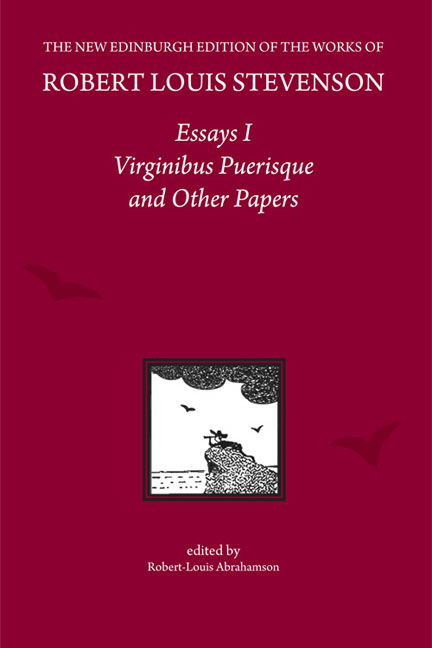Book contents
- Frontmatter
- Contents
- Acknowledgements
- Preface by the General Editors
- List of Abbreviations
- Chronology of Robert Louis Stevenson
- Stevenson’s Essays
- Stevenson as Essayist
- Introduction
- VIRGINIBUS PUERISQUE AND OTHER PAPERS
- Appendices
- Note on the Text
- Emendation List
- End-of-Line Hyphens
- Explanatory Notes
Stevenson as Essayist
Published online by Cambridge University Press: 11 November 2020
- Frontmatter
- Contents
- Acknowledgements
- Preface by the General Editors
- List of Abbreviations
- Chronology of Robert Louis Stevenson
- Stevenson’s Essays
- Stevenson as Essayist
- Introduction
- VIRGINIBUS PUERISQUE AND OTHER PAPERS
- Appendices
- Note on the Text
- Emendation List
- End-of-Line Hyphens
- Explanatory Notes
Summary
DEFINITION OF ‘ESSAY’
The essay is a short non-fictional prose composition, characterized by an exploratory approach to its subject. In its archetypical form in Montaigne it follows the line of the writer's thought, built in part out of quotation and reference to earlier authorities, often about some overlooked everyday phenomenon, adopting a confidential relationship with the reader and creating a distinctive personality for the writer. The genre excludes the long narratives of history and autobiography, as well as prose with the practical aim of persuasion or denunciation.
Such archetypal essays are often called ‘familiar’ or ‘personal essays’. In contrast, the ‘formal essay’ has less focus on the writer and style, personal memories and observations. Nevertheless, the formal essay is still exploratory and is therefore distinct from the more methodologically rigorous treatise or the scientific paper.
Stevenson himself applies the term to a variety of writing, including the short pensée (in ‘Essays, Reflections and Remarks on Human Life’), the paper for debate read to a university debating society, the treatise-like ‘Lay Morals’, his planned study of ‘The Transformation of the Highlands’ after 1745 (which he thinks will turn into ‘a long essay’; Letters 3: 129), and a planned work of comparative literary history (‘Ramsay, Fergusson and Burns: An Essay’; Letters 2: 165). He even uses the word to describe Kidnapped, meaning an experiment, a sketch: it is ‘no work, only an essay’ (Letters 5: 314).
Nevertheless, his normal use of ‘essay’ corresponds to the consensus definition. It is true that he sometimes makes a distinction between ‘essays’ and ‘studies’: freely wandering familiar essays and more focussed literary and historical studies. The former type, familiar essays proper, include those collected in Virginibus Puerisque and Memories and Portraits, which he considered re-issuing together in 1887 as Familiar Essays I and II (Letters 5: 436), implicitly distinguishing them from the essays in the 1882 volume Familiar Studies of Men and Books. These he refers to in the Preface to the volume only as ‘studies’, never as ‘essays’, and elsewhere refers to such works as ‘critical essays’ or ‘critical papers’ (Letters 2: 165, 5: 217, 6: 142), and the distinction of familiar essays and studies continues in his planning for the Edinburgh Edition (Letters 8: 225).
- Type
- Chapter
- Information
- Essays IVirginibus Puerisque and Other Papers, pp. xxxiii - lxviiiPublisher: Edinburgh University PressPrint publication year: 2018



